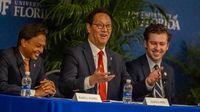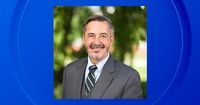As Santa Ono prepares to transition from the University of Michigan to the University of Florida, he has made it clear that combating antisemitism will remain a top priority during his presidency. This commitment was reiterated on May 8, 2025, when Ono stated, "Combating antisemitism will remain a priority," emphasizing that this focus has been a consistent aspect of his career.
Ono's appointment comes after the departure of Ben Sasse, a former Nebraska senator who served as UF president until stepping down last year. Sasse was notable for being among the first university leaders to condemn the Hamas terrorist attack on October 7, 2023, a stance that has drawn attention in the context of rising antisemitism on campuses across the nation.
At the University of Florida, where nearly 20% of the student body identifies as Jewish, Ono intends to uphold the university's reputation as a national leader in combating antisemitism and hate. He pledged to ensure that UF remains a supportive environment for Jewish students and that all forms of hatred and discrimination are confronted head-on.
In his op-ed for Inside Higher Ed, Ono reflected on his decision to eliminate centralized diversity, equity, and inclusion (DEI) offices at the University of Michigan, which have faced scrutiny for failing to adequately address rising antisemitism. He stated, "Like many, I supported what I believed to be the original intent of DEI — ensuring equal opportunity and fairness for every student. But over time, I saw how DEI became something else — more about ideology, division and bureaucracy, not student success." This decision, while controversial, was defended by Ono as necessary for redirecting resources toward academic achievement.
The University of Michigan has faced significant challenges regarding antisemitism, particularly in the aftermath of the war in Gaza that followed the Hamas attack. Last year, a Jewish student was assaulted in what was classified as a bias-motivated attack, highlighting the urgent need for effective leadership in addressing such issues. Ono has been viewed as an ally of the pro-Israel community, and his home was even targeted by pro-Palestinian vandals on the anniversary of the attack.
As Ono prepares to leave Michigan, Domenico Grasso, the current chancellor of the University of Michigan-Dearborn, has been named interim president. Grasso, who has been credited with significant improvements in graduation rates and research funding at Dearborn, will lead the search for a permanent president for the Ann Arbor campus.
Ono's decision to lead UF is rooted in his alignment with the state's vision for higher education, which emphasizes academic excellence and intellectual diversity. He stated, "Public universities have a responsibility to remain grounded in academic excellence, intellectual diversity and student achievement. That means rejecting ideological capture, upholding the rule of law and creating a culture where rigorous thinking and open dialogue flourish. I share that commitment."
Despite his qualifications, Ono's candidacy has faced criticism from conservative figures in Florida. U.S. Rep. Byron Donalds, a Republican who is running for governor, expressed concerns about Ono's past support for DEI initiatives, stating, "I don't know how this guy became the only finalist (at UF), but know they need to go back to the drawing board." Donalds’ remarks were echoed by Chris Rufo, a trustee at New College of Florida, who labeled Ono as a "left-wing administrator" and criticized his past comments supporting DEI.
Florida Governor Ron DeSantis, however, has backed the UF Board of Trustees in their decision to recommend Ono as president. DeSantis emphasized the importance of rejecting what he termed "woke indoctrination" in higher education and expressed confidence in the board's judgment. He stated, "There can be no ambiguity. I don't think anybody is going to be unclear about what the expectations are in the state of Florida with respect to higher education."
Ono's selection as UF's president is pending approval from the university's Board of Trustees, with their next meeting scheduled for June 5-6, 2025. If confirmed, Ono could potentially earn a salary of up to $3 million per year, a package that would place him in the 90th percentile for university presidents in the United States.
As Ono prepares for this new chapter, he faces the challenge of addressing the criticisms leveled against him while maintaining the commitments he has made to foster an inclusive and respectful campus environment. His leadership will be closely watched, particularly in light of the ongoing national dialogue surrounding DEI initiatives and campus safety.
In the meantime, the University of Michigan is moving forward with its own leadership transition, having appointed Grasso as interim president while a search for a permanent successor is underway. Grasso's appointment is expected to be affirmed by the Board of Regents at their upcoming meeting, marking a new era for the university as it navigates the complexities of higher education in a rapidly changing landscape.
Ultimately, the outcomes of these transitions at both universities will have lasting implications for their respective student bodies and the broader discourse surrounding higher education in America.





